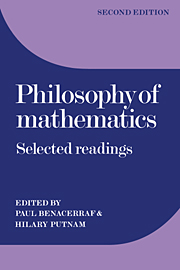Book contents
- Frontmatter
- Contents
- Preface to the second edition
- Introduction
- Part I The foundations of mathematics
- Symposium on the foundations of mathematics
- Disputation
- Intuitionism and formalism
- Consciousness, philosophy, and mathematics
- The philosophical basis of intuitionistic logic
- The concept of number
- Selections from Introduction to Mathematical Philosophy
- On the infinite
- Remarks on the definition and nature of mathematics
- Hilbert's programme
- Part II The existence of mathematical objects
- Part III Mathematical truth
- Part IV The concept of set
- Bibliography
Symposium on the foundations of mathematics
Published online by Cambridge University Press: 05 June 2012
- Frontmatter
- Contents
- Preface to the second edition
- Introduction
- Part I The foundations of mathematics
- Symposium on the foundations of mathematics
- Disputation
- Intuitionism and formalism
- Consciousness, philosophy, and mathematics
- The philosophical basis of intuitionistic logic
- The concept of number
- Selections from Introduction to Mathematical Philosophy
- On the infinite
- Remarks on the definition and nature of mathematics
- Hilbert's programme
- Part II The existence of mathematical objects
- Part III Mathematical truth
- Part IV The concept of set
- Bibliography
Summary
The logicist foundations of mathematics
The problem of the logical and epistemological foundations of mathematics has not yet been completely solved. This problem vitally concerns both mathematicians and philosophers, for any uncertainty in the foundations of the “most certain of all the sciences” is extremely disconcerting. Of the various attempts already made to solve the problem none can be said to have resolved every difficulty. These efforts, the leading ideas of which will be presented in these three papers, have taken essentially three directions: Logicism, the chief proponent of which is Russell; Intuitionism, advocated by Brouwer; and Hilbert's Formalism.
Since I wish to draw you a rough sketch of the salient features of the logicist construction of mathematics, I think I should not only point out those areas in which the logicist program has been completely or at least partly successful but also call attention to the difficulties peculiar to this approach. One of the most important questions for the foundations of mathematics is that of the relation between mathematics and logic. Logicism is the thesis that mathematics is reducible to logic, hence nothing but a part of logic. Frege was the first to espouse this view (1884). In their great work, Principia Mathematica, the English mathematicians A. N. Whitehead and B. Russell produced a systematization of logic from which they constructed mathematics.
We will split the logicist thesis into two parts for separate discussion:
The concepts of mathematics can be derived from logical concepts through explicit definitions.
[…]
- Type
- Chapter
- Information
- Philosophy of MathematicsSelected Readings, pp. 41 - 65Publisher: Cambridge University PressPrint publication year: 1984

